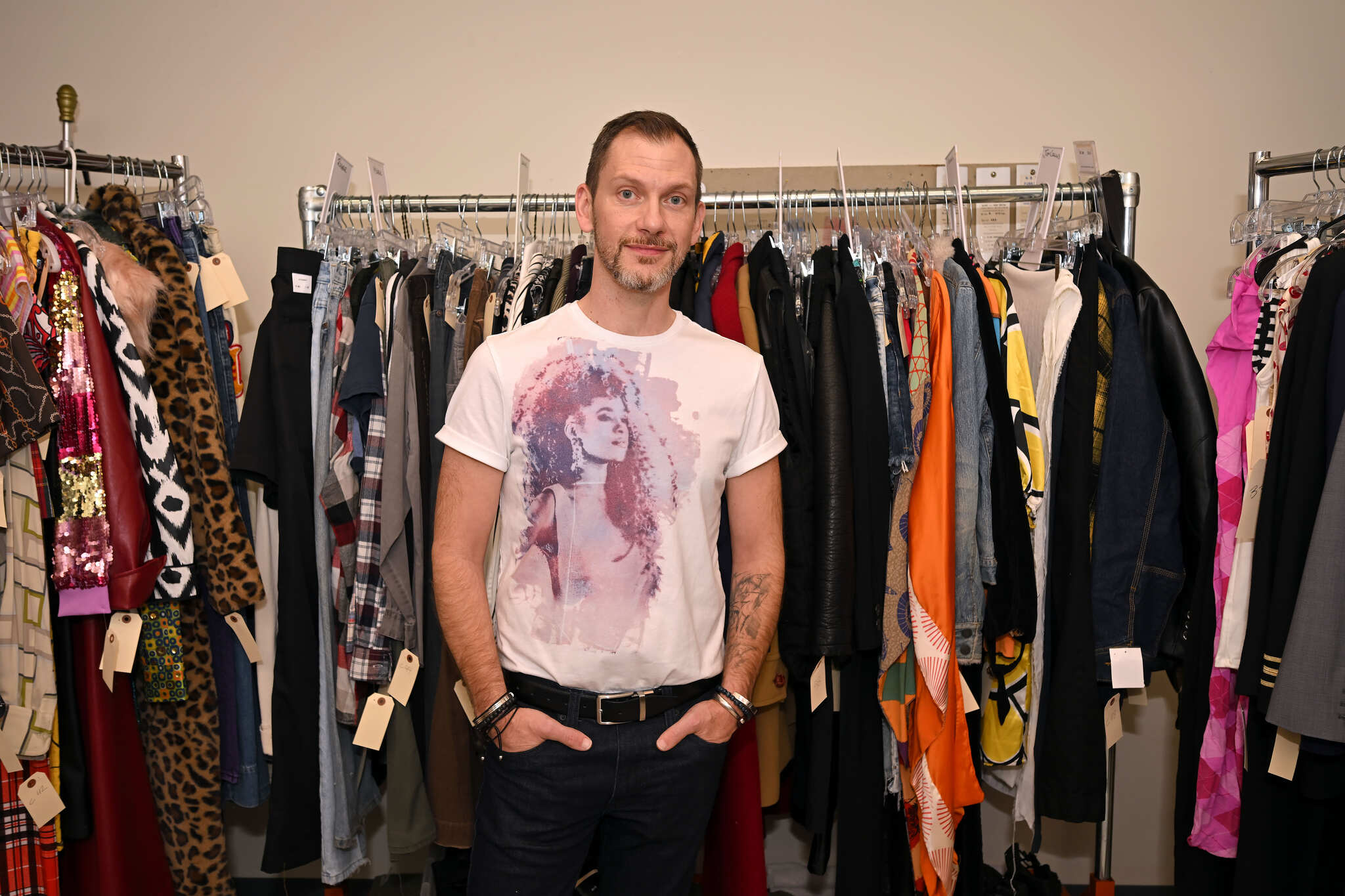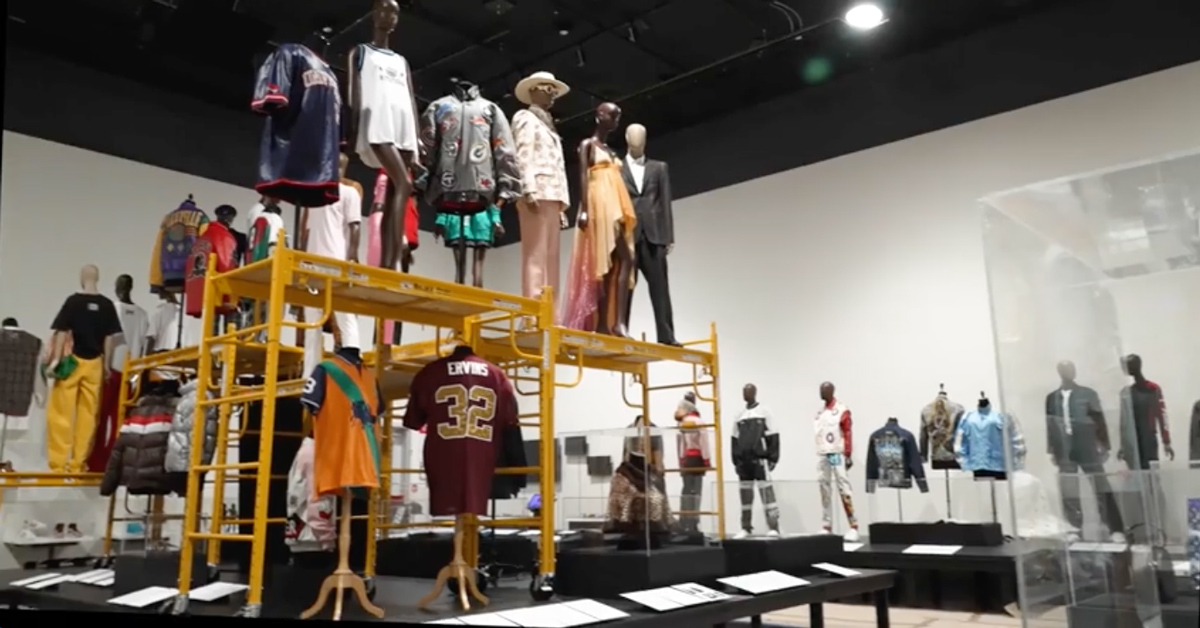“Fashioning Selves: Dress and Identity” course delves into who wears what and why

Professor Clinton O’Dell’s class explores how garments tell stories, express values and influence perceptions
A T-shirt is not just a T-shirt. With or without words, the garment, like everything we wear, is a fashion statement that speaks to who we are, who we want to be or who we want others to think we are. This semester, Clinton O’Dell, Wheaton College associate professor of theatre and resident scene and costume designer, is teaching a First-Year Experience (FYE) class that delves into this subject. The course, “Fashioning Selves: Dress and Identity,” explores fashion, clothing, appearance and identity for students to gain a deeper understanding of the complex and interconnected topics. On September 18, in connection with the course, the Department of Theatre and Dance with support from Diversity, Equity and Access Leadership (DEAL), will host a presentation by Elizabeth Way, associate curator of the Museum at the Fashion Institute of Technology in New York City, on the museum’s recent exhibition “Fresh, Fly, Fabulous: Fifty Years of Hip Hop Style.” Way also will visit O’Dell’s class that day to talk about Black fashion designers. Both engagements present the perfect timing to ask O’Dell, who also designs and executes the clothing actors wear to bring characters to life in major TV and film productions, some questions about his class and the role fashion plays in self-expression and influencing perceptions.
What led you to create this class?
“I created it because it focuses on subject matter that I love, but that I don’t get to touch on as often with the responsibilities I have in the Theatre and Dance Department. A lot of what I do is in service to a production, but, in this case, this is not about theater. It’s not about stage production or costume design for a character. It’s a much more societal viewpoint about how we view ourselves, and how fashion lets us get to know ourselves and how it lets other people get to know us. That really is a fashion studies, cultural studies standpoint, much more so than a costume design standpoint. That lets me bring in history and sociology perspectives. In addition to bringing in Liz to talk about Hip Hop style and Black designers, I’m going to be taking students to see what we have in our Permanent Collection. I also will bring in C.C. Chapman [senior professor of the practice of business and management] to talk about the business end and the industry behind fashion.”
How does clothing reflect identity?
“‘How does it not?’ is maybe a better place to start. It’s such a complex set of identities that are always intersecting. We’re never one thing at any one time. We are always multiple identities intersecting and embodied all in the same moment. The way our clothing lets that come forward or sometimes masks that, depending on the circumstance, could happen in any number of ways. It’s generational. It’s about what is available to us; we can’t wear what we don’t have. It’s location based in some ways, and it’s always about creating a sense of belonging or a sense of differentiation—signaling to others that you are a part of some group. Signaling to others that you’d like to be a part of that group or, in a more rebellious or contentious way, you might signal that you are not a part of that group. Punk rock is one really obvious, easy example of an entire youth culture signaling ‘we are not like our parents.’ I think hip hop style is a really great example of how fashion can amplify something else. Fashion can amplify art. Fashion can amplify a message. Fashion can amplify a point of view. And then, by the same token, the point of view shapes and influences fashion.
“So, the way that clothing becomes a viewfinder for all those intersecting identities is such a broad spectrum of approaches. We signal gender, we signal race and ethnicity, we signal sexuality, we signal social class. And we don’t always tell the truth, which is one of the most wonderful things about fashion—it lets us be someone for a day and see if we like that. And, in that sense, it also helps us find more specifically who we are. So, there are a million different windows into how clothing reflects identity, but always with the fact that it is an embodied practice. Our body itself is the thing that becomes the mechanism for communication.”

What are you wearing today and what are you telling us?
“I’m wearing a Whitney Houston T-shirt and just a pair of black jeans. I’m telling you that I love Whitney Houston. I also made the print on this T-shirt. I’m signaling a certain set of values with the color palettes. These are colors that might be considered in a more feminine vocabulary—a little purpley pink, which also happens to be a large part of the color palette of the video that this image comes from, ‘I Wanna Dance With Somebody.’ In a way, I’m signaling a generational aspect: I’m of a certain age. Not that you can’t also love her if you’re 19 years old, but she means something different to a different generation. … I’m trying to signal that I’m not the kind of professor who sits at a desk all day. I’m not the kind of professor that you would expect to find in front of a boardroom. Also, to somebody, maybe I’m signaling that I am a maker rather than a talker. … And really, if we want to get really, really finicky and break it down, I’m signaling things about the economy that I live in. I bought this T-shirt at Target in Attleboro [Mass.], but it was manufactured in someplace very, very far away in a completely damaged economic model. So, there’s a consumerist aspect that I’m signaling.”
Do most of us think this deeply about what we wear?
“I think some people think about it, but I think most of us need to be prompted. It’s useful if we’re all conscious of the values that are driving us. Having clothing on my body is very personal. Fashion offers us a world of information, if we can remember to think about it. It has been interesting so far to talk to these incoming students about what they think of when I ask ‘what is fashion?’ It’s not necessarily their first thought to think about a garment factory in Bangladesh. And why would it be? No one’s asked them to think of it before. But it’s much easier to think about Rihanna on a red carpet, because that’s what our media presents to us so often. But there’s also a commentary of value in the fact that Rihanna gets a lot more news coverage than the garment worker in Bangladesh. Someone has determined the value that has led to that reality. I think it’s fascinating.”
What are some key insights you hope students will gain from your course?
“Always with first-year students, one of my main goals is just to expose them to as many things as I can, because we don’t know who they are yet and they don’t know who they are yet. And the process of discovery requires seeing stuff. FYE is intentionally designed to be multidisciplinary, so, I want to expose them to as many academic disciplines as I can as they’re starting to figure out what they want. Beyond that, outside of those sort of academic prescribed goals, it’s always my hope that the course will just help the students get to know themselves a little bit better than they did before. Maybe they will walk away thinking that they’re capable of something that they didn’t think they were capable of when we started. I think the whole point of education is just to find oneself, and then take some action based on what you find. Of course, you have to find yourself first. So, if I can help with that, everything else is a bonus.”
What do you hope students gain from Elizabeth Way’s hip hop style talk?
“I’m really hyper-aware of the fact that our students who have just come in were not even born in the eighties and the nineties, when a lot of hip hop fashion was really being cemented. So, there’s a history lesson there. The nineties are back in fashion in some ways, but students today never saw the real version of nineties fashion. They’ve only seen a reiteration of it. So, there’s that aspect. I think we could all do with a little celebration of something that feels empowering, something that’s certainly serious and not to be dismissed, but can also be fun at the same time. … And I would like them to see somebody who has spent her career working in fashion archives with actual garments, dealing with licensing. Someone who’s got real experience with those things, just in case that’s what somebody wants to be when they move on from Wheaton. And I think it’s important to decentralize fashion and make sure that we don’t only think of it as couture, as runway fashion—although there’s plenty of runway fashion in this presentation. I want them to know that everyday garments are also important. Sneakers are important in the same way that $15,000 boots are important. So, I really just want the biggest, broadest, most mind-opening experience that they can take away from it.”
